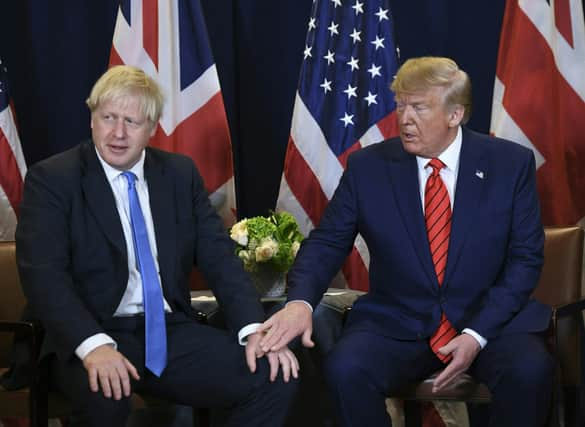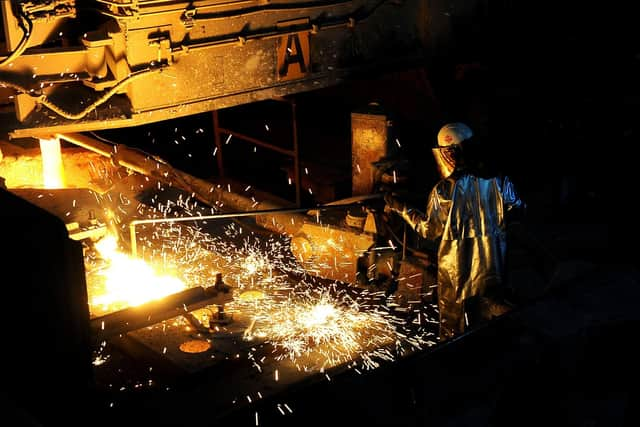US trade deal can ignite our economic recovery after pandemic: Liz Truss


We will do whatever it takes to support United Kingdom businesses to continue trading, with our network of 350 advisers across the country and trade commissioners across the world.
This crisis highlights just how important it is to keep trade flowing and supply chains open, so that we can all have the essential supplies we need. It is free and open trade that has ensured that we have food on our table and access to vital personal protective equipment and medication.
Advertisement
Hide AdAdvertisement
Hide AdAt meetings with my fellow G20 Trade Ministers, I have continually called for a united global response, tariff cuts on key supplies and reform of the World Trade Organisation.


Although it is unfortunate that some countries have resorted to protectionism, many have sought to liberalise in the face of this crisis. I have been working with colleagues such as Australia, New Zealand and Singapore to highlight the importance of keeping trade flowing.
Free trade and resilient supply chains will be crucial to the global recovery as the crisis passes. Time after time, history has shown us that free trade makes us more prosperous, while protectionism results only in poverty, especially for the worst off.
Britain has a proud history as a global leader and advocate of free trade. The bold and principled decision of Sir Robert Peel to take on the power of the wealthy producers and repeal the corn laws in 1846 ushered in an unprecedented era of free trade that saw ordinary people in Britain benefit from more varied and cheaper food, helping to grow our cities and power forward the world’s first industrial revolution.
Advertisement
Hide AdAdvertisement
Hide AdI see a real opportunity again for industrial areas across Britain as we become an independent trading nation. By cutting tariffs and reducing export red tape, our great British businesses will be able to sell more goods around the world. British steel, ceramics and textiles are some of the world’s best, but all too often they are subject to high tariffs and barriers. Those industries are already looking forward to the opportunities that future trade deals will bring.


The US imposes tariffs of 25 per cent on steel; removing them would boost our domestic industries and particularly benefit areas such as Yorkshire and the Humber, which account for more than a third of our iron and steel exports to the United States.
Indeed, UK Steel said: “A new UK/US Free Trade Agreement would provide a significant boost to our trade to this high-value market, create a global-competitive advantage for UK steel producers, and open up valuable new market opportunities.”
Our farmers and food producers stand to gain from a trade deal with the US. The US is the world’s second largest importer of lamb, but current restrictions mean that British producers are kept out. We can also grow, for example, our malting barley exports from Scotland and the east of England.
Advertisement
Hide AdAdvertisement
Hide AdThe tech trade will benefit from a US free trade agreement through cutting-edge provisions on digital and data. While free trade provides opportunities, protectionism would harm farmers, tech entrepreneurs and steel manufacturers.


We have already seen this before: in 1930, the Smoot-Hawley Act raised US tariffs on more than 20,000 imported goods, resulting in retaliation from other nations and the deepening and prolonging of the depression.
As President Reagan said in 1985: “Protectionism almost always ends up making the protected industry weaker and less able to compete against foreign imports…Instead of protectionism, we should call it destructionism. It destroys jobs, weakens our industries, harms exports, costs billions of dollars to consumers, and damages our overall economy.”
We have a golden opportunity to make sure that our recovery is export led and high value – a recovery that will see our industrial heartlands create more high-quality and high-paying jobs across all sectors.
Advertisement
Hide AdAdvertisement
Hide AdFree trade does not just benefit us here in Britain; it benefits the world. Since the end of the Cold War, free trade has lifted a billion people out of extreme poverty.
For want of a better word, free trade is good. It is those benefits that underpin our Government’s approach: free and fair trade fit for the modern world.
Liz Truss is the International Trade Secretary and spoke in Parliament on the Trade Bill. This is an edited version. She grew up in Leeds.
Editor’s note: first and foremost - and rarely have I written down these words with more sincerity - I hope this finds you well.
Advertisement
Hide AdAdvertisement
Hide AdAlmost certainly you are here because you value the quality and the integrity of the journalism produced by The Yorkshire Post’s journalists - almost all of which live alongside you in Yorkshire, spending the wages they earn with Yorkshire businesses - who last year took this title to the industry watchdog’s Most Trusted Newspaper in Britain accolade.
And that is why I must make an urgent request of you: as advertising revenue declines, your support becomes evermore crucial to the maintenance of the journalistic standards expected of The Yorkshire Post. If you can, safely, please buy a paper or take up a subscription. We want to continue to make you proud of Yorkshire’s National Newspaper but we are going to need your help.
Postal subscription copies can be ordered by calling 0330 4030066 or by emailing [email protected]. Vouchers, to be exchanged at retail sales outlets - our newsagents need you, too - can be subscribed to by contacting subscriptions on 0330 1235950 or by visiting www.localsubsplus.co.uk where you should select The Yorkshire Post from the list of titles available.
If you want to help right now, download our tablet app from the App / Play Stores. Every contribution you make helps to provide this county with the best regional journalism in the country.
Sincerely. Thank you.
James Mitchinson
Editor
Comment Guidelines
National World encourages reader discussion on our stories. User feedback, insights and back-and-forth exchanges add a rich layer of context to reporting. Please review our Community Guidelines before commenting.